Lateral Collateral Ligament (LCL) Injury of the Knee: Diagnostic in the Best Hospitals of Germany
Treatment prices are regulated by national law of the corresponding countries, but can also include additional hospital coefficients. In order to receive the individual cost calculation, please send us the request and medical records.
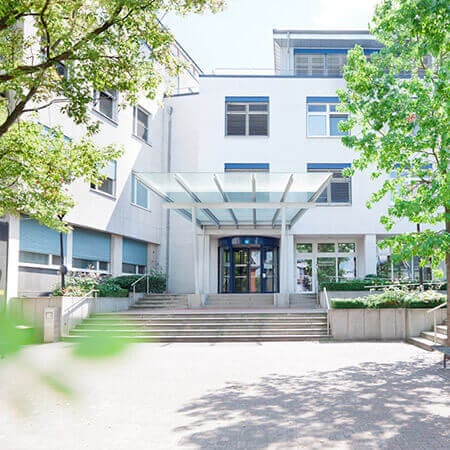
Department of Adult and Pediatric Orthopedics, Traumatology
The Department of Adult and Pediatric Orthopedics, Traumatology is part of the specialized Center for Musculoskeletal Disorders, whose medical team consists of highly qualified orthopedists, traumatologists, and spinal surgeons. The department offers modern diagnostics and treatment of the entire range of musculoskeletal diseases. The department's field of competence includes the treatment of injuries of varying severity. The therapeutic options cover both conservative measures and surgical interventions, which are mainly performed using sparing minimally invasive techniques. The treatment concept is based on the comprehensive approach – from the use of conservative methods to physiotherapeutic procedures the day after surgery.
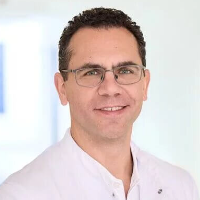


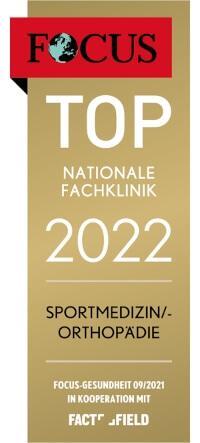
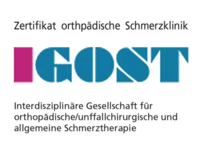
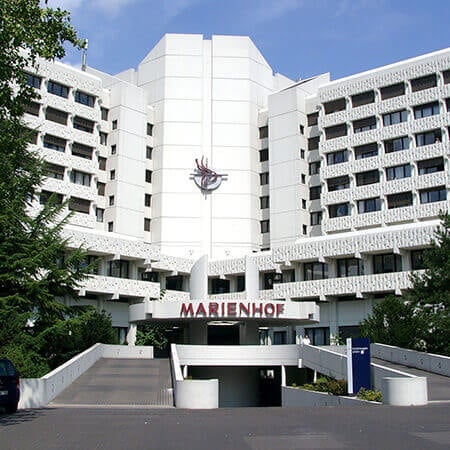
Department of Adult and Pediatric Orthopedics, Traumatology, Foot Surgery
According to the prestigious Focus magazine, the Department of Adult and Pediatric Orthopedics, Traumatology, Foot Surgery ranks among the top German medical facilities specializing in hip surgery! The department offers the full range of high-precision diagnostics and conservative and surgical treatment for diseases of bones, joints, muscles, ligaments, and tendons. One of the department's key areas of clinical practice is large joint arthroplasty. In this area, the department is awarded the prestigious endoCert certificate. The doctors in the department's operating rooms successfully perform knee, hip, and shoulder replacement surgery. Whenever possible, preference is given to minimally invasive joint replacement surgery. An important part of the work of the department's doctors is the treatment of orthopedic diseases and musculoskeletal injuries in children. The specialists at the medical facility also have long experience in helping patients with foot pathologies and deformities, including hallux valgus, hallux rigidus, hammer toes and claw toes, metatarsalgia, etc. The department's doctors have in their arsenal state-of-the-art equipment and modern treatment methods that allow for the achievement of excellent therapeutic results. More than 3,500 inpatients and about 17,000 outpatients are treated at the medical facility every year.
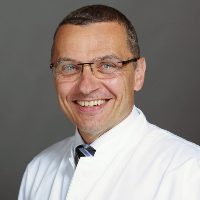

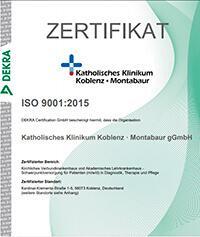
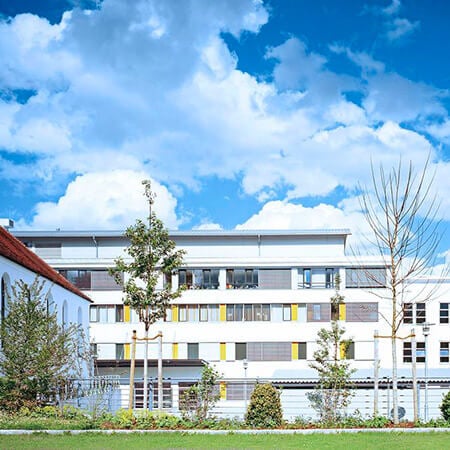
Department of Orthopedics, Traumatology, Spinal Surgery and Foot Surgery
According to the Focus magazine, the Department of Orthopedics, Traumatology, Spinal Surgery and Foot Surgery ranks among the top German medical facilities in treating orthopedic diseases and spinal surgery! The department carries out comprehensive examinations and effectively treats musculoskeletal diseases and injuries. The department has about 130 beds for its patient hospitalization. Doctors annually admit more than 4,000 patients for inpatient treatment. Several thousand surgical interventions of varying complexity are performed on the basis of the medical facility annually. The department offers the services of the certified Maximum Care Joint Replacement Surgery Center (EPZmax) and the certified Trauma Center. In addition, the department's specialists have vast experience in treating spinal and foot pathologies. The main goal of the department's doctors is to restore mobility and eliminate pain. The specialists always prefer an individual approach to each patient and his clinical case.
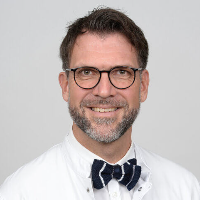

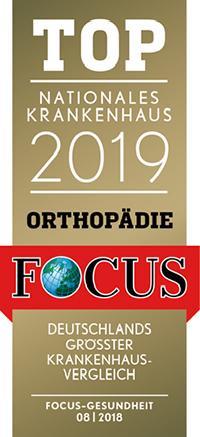
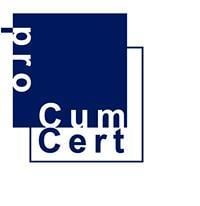

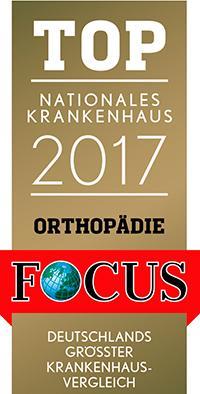
Injuries of the medial and lateral ligaments are among the most common causes of knee instability. They are not always diagnosed timely, so physicians often have to correct the consequences of an old injury. You can undergo diagnostics of a knee injury in Germany. Physicians in this country use the very latest equipment and have vast practical experience. You will undergo a comprehensive clinical and instrumental examination to determine the peculiarities of the injury and the severity of the tear, as well as to determine concomitant injuries (other ligaments, menisci, cartilage damage) and elaborate the treatment tactics properly.
Content
- Why is timely diagnostics important?
- Peculiarities of injury
- Clinical diagnostics
- Diagnostic methods
- MRI for LCL diagnostics
- Arthroscopy
- Why is it worth undergoing a diagnostics in Germany?
Why is timely diagnostics important?
Knee injuries account for up to 50% of joint injuries and 25% of all limb injuries. It is very important to detect pathological changes in the joint at the initial stage, since in timely treatment, the functional results are much better. Untimely or incorrect diagnosis making, leads to an injury becoming chronic. As a result, the patient will have chronic knee instability or the progression of osteoarthritis. Treating old injuries is more complex than treating recent ones.
On average, up to 30% of lateral knee ligament tears in the world are not diagnosed or are detected late. Physicians often miss ruptures of the peroneal collateral ligament – up to 80% of cases are not detected in the acute period. As a result, 45% of these operations are performed on chronic injuries.
In countries with poor medicine, only 20-40% of cases of lateral ligament tears are detected during the first outpatient appointment for a sports knee injury. The average time from injury to surgery is 6 months to 6 years. If years have passed since the injury, then during a surgical intervention, physicians often have to deal with the phenomena of the degeneration of the articular cartilage, which causes chronic pain in the knee and impaired mobility.
However, if you are undergoing an examination in Germany, you can be sure that all injuries will be detected and that you will receive the necessary medical care. Do not delay an examination: the more time that passes from the moment of injury, the more advanced the pathological changes in the knee are, and as a rule, they are irreversible.
Peculiarities of injury
LCL are the stabilizers of the knee joint. They prevent excessive rotation of the lower leg. It is possible to injure these ligaments with sharp excessive movements of the lower leg with a fixed foot or when hitting the knee. Athletes who jump at high speed are most often injured, namely skiers, gymnasts, tennis players, hockey players, etc. The trauma can be isolated or combined. Isolated injuries are most common in tennis players and gymnasts. In other athletes, injuries of the lateral ligaments are more often combined with meniscus tear, damage to the knee capsule, other ligaments, and hyaline cartilage. The capitulum fibulae may tear off.
Clinical diagnostics
Although the diagnosis must be confirmed by instrumental methods, the diagnostics begins with clinical examinations. The physician assesses the symptoms: usually it is pain during palpation and swelling of the tissues. These signs are nonspecific. They are detected in almost all cases of knee injury, including those without ligament rupture.
In a case of a recent injury, severe swelling of the knee develops immediately after the injury. After 2-3 days, a focus of hemorrhage occurs, sometimes extensive, with extension to the lower leg. During the examination, the doctor sees a symptom of a floating patella: it "pops up" due to the hemarthrosis (accumulation of blood in the knee), when shifted inside the joint.
An objective examination reveals a lateral deviation of the lower leg in the opposite direction, since it is no longer held by a torn ligament. In most cases, the medial lateral ligament is torn. Accordingly, the lower leg deviates outward. Less commonly, the lateral ligament is torn, in this case the lower leg deviates inward.
Excessive deviation is revealed when performing a functional test. The physician fixes the outer surface of the knee with his hand, while with the other hand he tries to deflect the lower leg. The symptom must be checked on both limbs to exclude a false positive result due to the individual structural features of the knee ligaments. When the lateral ligaments are torn, the symptom is defined as positive only on one leg: the deviation of the lower leg is greater than of the second one.
Acute trauma makes examination painful. Therefore, both palpation and functional tests are performed after first aid. A needle is inserted into the joint, blood is removed, and local anesthetics are injected to reduce pain.
The following methods are used to diagnose an LCL injury:
- clinical history taking, clarifying the mechanism of injury;
- clinical examination, clinical tests;
- radiography;
- ultrasonography;
- MRI.
An old injury does not hurt. The knee sometimes swells, but the symptom is much weaker than at the time of injury. However, chronic instability develops, which is felt by the patient. The person has to use knee pads or bandages to feel stability in the joint. If the knee pain returns several months or years after the injury, it is very likely a sign of аrthritis.
Diagnostic methods
The following methods are used to diagnose the LCL injury:
- Clinical history taking, clarifying the mechanism of injury.
- Clinical examination, clinical tests.
- Radiography.
- Ultrasonography.
- MRI.
Instrumental diagnostics of an LCL injury was first developed in 1905. Hoff and Werendorf suggested blowing air into the knee and then taking X-ray images. More recently, functional X-ray devices appeared, which take X-ray images from different angles of the knee to look for signs of ligament damage. However, an X-ray still does not visualize soft tissues well and therefore, is not considered the main method for diagnosing an articular pathology. X-rays only show total ruptures of lateral ligaments and have a limited ability to detect concomitant injuries.
Arthrography is a more accurate technique. It involves the injection of a contrast medium inside the knee, followed by taking pictures. However, this method is invasive, so it is not often used in developed countries.
Ultrasound scans and MRIs are more informative methods of diagnosis. An ultrasound examination is most often performed, since this procedure is inexpensive, simple, and available in almost any clinic. An MRI is more expensive, but the technique is more accurate. In terms of information value, it is inferior only to arthroscopy, but this examination is invasive, so it is rarely used.
MRI for LCL diagnostics
In Germany, patients with a suspected lateral collateral ligament tear undergo an MRI.
If the medial ligament is torn:
- Grade 1 – the doctor sees its normal thickness. It is tightly attached to the upper layer of the bone. Edema and hemorrhages, which extend to the subcutaneous adipose tissues, are determined during the examination.
- Grade 2 – thickening and partial tear of the ligament is determined. Part of the fibers are displaced. They are separated from the underlying bone. At the same time, edema and hemorrhage are detected.
- Grade 3 – total disruption of the ligament fibers with the extension of damage to the capsular layer.
Signs of LCL injury on an MRI are less dependent on the stage. The lateral ligament is located outside the knee capsule. If it is damaged, a localized area of edema is revealed. Fluid may accumulate around the ligament. On the magnetic resonance imaging scan, the rupture area looks like a change in the ligament localization, with discontinuity of its fibers. A ligament injury is often complicated by a detachment of the capitulum fibulae.
Arthroscopy
Arthroscopy is the most accurate diagnostic method. However, it is invasive, so it is used infrequently. Diagnostic arthroscopy is carried out only with insufficient informativeness of an MRI.
The diagnostic procedure is a small surgery. It is performed under general or spinal anesthesia. The physician makes a small puncture in the knee and inserts a tiny video camera with lighting inside. He examines the articular cavity from the inside. As a result, he is able to detect all the damages: tears of ligaments, menisci, cartilage, damage to bone structures or the joint capsule, etc.
In Germany, arthroscopy is a safe procedure that does not require a long recovery period. It is often an outpatient procedure, and a patient can leave the hospital the same day. If surgical treatment is planned, then it is performed immediately after the diagnostics. The physician can suture the torn ligament in a case of a recent injury, or restore it from other tissues.
Why is it worth undergoing a diagnostics in Germany?
Sports medicine and orthopedics are of the highest level in Germany, so athletes from all over the world come to German hospitals to get rid of the consequences of injuries. Not only recent, but also chronic injuries are successfully treated here, and patients are also "retreated" after unsuccessfully performed surgeries in their native countries.
There are several reasons why it is better to undergo diagnostics in Germany:
- the very latest equipment, which is constantly updated;
- experienced physicians, who undergo extensive training and can accurately interpret the results of laboratory and instrumental tests;
- successful detection of not only LCL injury of the knee, but also concomitant injuries;
- quick, convenient, and comfortable for the patient, examination within one medical facility;
- reliable pain management during unpleasant or painful diagnostic procedures;
- preference is given to sparing and safe diagnostic methods that do not require the injection of a contrast agent inside the knee joint.
If you are planning to receive treatment in Germany, then it is also better to undergo diagnostics in this country. You can count on good results if the same physician develops the examination regimen, assesses the diagnostic results, and performs the treatment in Germany.
To undergo treatment for LCL injury in Germany it is better to use the Booking Health service. On our website you have the opportunity to get up-to-date and accurate information about the cost of treatment in Germany, compare prices in different German hospitals, and book a medical program at a favorable price. The treatment will be easier and quicker for you, and the cost of treatment in Germany will be lower.
You are welcome to leave your request on the Booking Health website. Our medical advisor will contact you, consult with you, and answer all of your questions. We will take care of the organization of your trip abroad. We will provide the following benefits for you:
- We will select the best German sports medicine hospital, whose doctors specialize in the diagnostics and treatment of injuries of the lateral collateral ligament and achieve the best results.
- We will help you to overcome the language barrier and establish your communication with the doctor in the German hospital.
- We will reduce the waiting period for examination and treatment of LCL injuries, and you will receive medical care on the most suitable dates for you.
- We will reduce the prices. The cost of treatment in Germany will be lower than usual due to the exclusion of overpricing and additional coefficients for foreign patients.
- Our experts will solve any organizational issues: paperwork, transfers from the airport to the German hospital and back, hotel booking, interpreting services, etc.
- We will prepare your documents and translate them into English or German. Thus, you will not have to repeat any previously performed diagnostic procedures.
- We will stay in contact with the German hospital after your treatment is complete.
- We will organize additional diagnostics and treatment, if necessary.
- We will buy medicines in the other country and forward them to your native country.
While the best specialists in sports medicine take care of your health, the Booking Health staff will help you to reduce the cost of treatment in Germany and take care of all your travel arrangements.
Authors:
The article was edited by medical experts, board certified doctors Dr. Nadezhda Ivanisova and Dr. Vadim Zhiliuk. For the treatment of the conditions referred to in the article, you must consult a doctor; the information in the article is not intended for self-medication!
Sources:
Journal of Orthopaedic Surgery and Research
Articles for Orthopaedic Practice - Orthogate

